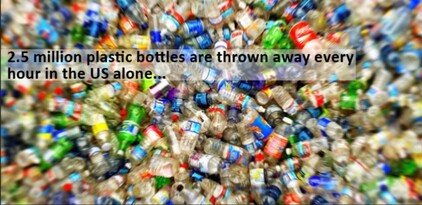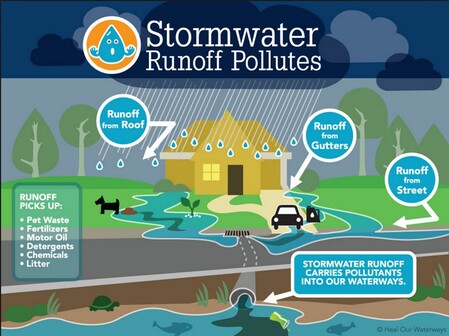CONSERVING WATER

Clean water is a precious resource essential to our survival. We hear about disastrous shortages elsewhere but may feel immune to such shortages here in North Carolina. However, in spite of periods of abundant rainfall, we don’t have to go back very far in time to recall severe droughts and water restrictions in our own area. This area of North Carolina is growing by leaps and bounds, and the reservoirs supplying our water are becoming more polluted due to the pressures of rising population and the increased load of pollutants entering the watershed. So it’s not hard to imagine a future where clean water will be in short supply. It’s easy to feel powerless in the face of large issues like this, but if each of us takes steps to care for our water, even if it is only a few of the recommended ones, we can make a difference. Basically it comes down to using less water and trying to avoid polluting our water. And as a very significant side benefit, you’ll also be reducing your water and energy bills!
Reduce Use of Bottled Water
Estimates vary, but if all the water used in the entire manufacturing cycle is considered, it may take up to 6 or 7 liters of water to produce 1 liter of bottled water. The bottling process and distribution of bottled water also is energy intensive and disposal is a problem, especially since the majority of plastic bottles don’t get recycled. (see NPR article) So try to carry a reusable water bottle whenever possible to avoid having to purchase bottled water.
Use Water-saving Shower Heads, Low-flow Faucet Aerators, and High-efficiency Toilets
If you were frustrated by earlier models of these devices, you may find that the technology has improved and that newer ones give better results. When replacing these devices look for ones that are WaterSense rated by the EPA.
Use Your Dishwasher and Clothes Washer Wisely
When possible, use your dishwasher and clothes washer only for full loads, especially if the amount of water cannot be adjusted to the load. When replacing these appliances, look for Energy Star rated appliances which use less energy and water.
Check for and Repair Water Leaks
A small drip from a worn faucet washer can waste 20 gallons of water per day. A slow leaking toilet and larger leaks can waste much more. To detect a leak in your toilet, put a little food coloring in your toilet tank and see if it leaks through without flushing. To check your house for other undetected leaks, use the house water meter. Look up videos on youtube that match your type of water meter to see how to do this.
Recycle Water for Indoor and Outdoor Watering
Some ideas include: collect water for watering plants in a bucket while washing vegetables and while warming water for showers, dishes, and laundry; collect water for outdoor watering in Rain Barrels.
Reduce Use of Bottled Water
Estimates vary, but if all the water used in the entire manufacturing cycle is considered, it may take up to 6 or 7 liters of water to produce 1 liter of bottled water. The bottling process and distribution of bottled water also is energy intensive and disposal is a problem, especially since the majority of plastic bottles don’t get recycled. (see NPR article) So try to carry a reusable water bottle whenever possible to avoid having to purchase bottled water.
Use Water-saving Shower Heads, Low-flow Faucet Aerators, and High-efficiency Toilets
If you were frustrated by earlier models of these devices, you may find that the technology has improved and that newer ones give better results. When replacing these devices look for ones that are WaterSense rated by the EPA.
Use Your Dishwasher and Clothes Washer Wisely
When possible, use your dishwasher and clothes washer only for full loads, especially if the amount of water cannot be adjusted to the load. When replacing these appliances, look for Energy Star rated appliances which use less energy and water.
Check for and Repair Water Leaks
A small drip from a worn faucet washer can waste 20 gallons of water per day. A slow leaking toilet and larger leaks can waste much more. To detect a leak in your toilet, put a little food coloring in your toilet tank and see if it leaks through without flushing. To check your house for other undetected leaks, use the house water meter. Look up videos on youtube that match your type of water meter to see how to do this.
Recycle Water for Indoor and Outdoor Watering
Some ideas include: collect water for watering plants in a bucket while washing vegetables and while warming water for showers, dishes, and laundry; collect water for outdoor watering in Rain Barrels.

Minimize or Eliminate Use of Herbicides and Pesticides
Persistent and widespread use of herbicides and pesticides can be harmful to humans and wildlife and can runoff into streams and pollute our water supply.
Reduce Lawn Area, Xeriscape, and Use Organic Fertilizers
Reduce your lawn area to only that needed for recreation and walking paths. “Xeriscape” by landscaping with drought-resistant, native plants and mulching with leaves. These steps will greatly reduce the need for watering outdoors and reduce the runoff. Healthy garden soil with leaf mulch needs little or no fertilizing. Use an electric mulching mower and you should not have to fertilize your grass. But if you have to use fertilizers, organic fertilizers are much preferable and will reduce runoff of artificial fertilizers into lakes and streams.
JUST FOR KIDS: Learn about the water cycle
To contact the Eco Ministry with questions, get on our Friends of the Eco Ministry for the Earth email list, or explore joining our committee send an email to [email protected].
Persistent and widespread use of herbicides and pesticides can be harmful to humans and wildlife and can runoff into streams and pollute our water supply.
Reduce Lawn Area, Xeriscape, and Use Organic Fertilizers
Reduce your lawn area to only that needed for recreation and walking paths. “Xeriscape” by landscaping with drought-resistant, native plants and mulching with leaves. These steps will greatly reduce the need for watering outdoors and reduce the runoff. Healthy garden soil with leaf mulch needs little or no fertilizing. Use an electric mulching mower and you should not have to fertilize your grass. But if you have to use fertilizers, organic fertilizers are much preferable and will reduce runoff of artificial fertilizers into lakes and streams.
JUST FOR KIDS: Learn about the water cycle
To contact the Eco Ministry with questions, get on our Friends of the Eco Ministry for the Earth email list, or explore joining our committee send an email to [email protected].
